- Home
- Chaim Potok
Old Men at Midnight Page 10
Old Men at Midnight Read online
Page 10
Comrade Stalin calling us his friends! An astonishment!
He told us what we had lost to the Germans: Lithuania, Latvia, western White Russia, much of the Ukraine. He said, “Our country is in serious danger.” Everything that could be moved was to be sent eastward; all that could not be moved was to be burned, destroyed, wherever retreat proved inevitable. The struggle against the German enemy was to be relentless.
The town near my village—in German hands! German troops and tanks treading upon the unmarked mass grave of my parents, my sisters, the Rebbe, the others in the village. Heavy German boots marched over their bones.
No rest for me either.
Moscow was warm, windless. Long days, short nights. The atmosphere tense, silent. During the day we went about our work; at night the city lay dark, blacked out. People seemed to be straining, listening, waiting for the first sounds of approaching tanks and artillery. I rode through the city, thinking, Moscow is now a pleasant place. Different from when I had arrived twenty years before. Almost no food or fuel then. Cold gray skies, freezing mists, filthy ice in the winter, mucky puddles in the spring. Buckets, pitchers, rags during my brief stay in that basement room; I sawed wood for the stove, washed old potatoes in icy water, boiled them in a battered pot. I remembered: One year in the early thirties there had been no socks in the entire city; that was a year or two before Kirov, the Leningrad chief, was assassinated, and we thought they would start on all of us in Moscow after they finished with nearly the whole leadership in Leningrad—for carelessness, inadequate vigilance, negligence in connection with our duties. But they stopped with the Leningrad bunch and only started on us in Moscow a few years later when our minister got scooped up and put away. Somehow I survived. Moscow had become a fine city in which to live—and now a lot of us would be dying in it.
In early September we began to evacuate children under the age of twelve. A few days later word came down to our departments that the German northern army had completed the land encirclement of Leningrad. Then Kiev fell; we lost five armies there, more than half a million men. I lay in bed nights listening to the city: silence, darkness, millions of Muscovites holding their breath, waiting.
Three weeks later the order came to disassemble factories for evacuation eastward. Then the government fled the city—to Kuibyshev, about five hundred miles to the east. But Stalin remained behind and set up headquarters in the marble cavern of the Mayakovsky Metro station. I say that to his credit. He could have left with the others, but he chose not to.
In the meantime there were things our departments had to do. Much of our army was demoralized, units in disarray not only because of casualties but also on account of a general breakdown in discipline and sudden doubts about directions, plans, loyalties. We reinforced our security troops. And once again we began to attach political commissars to the army; we had stopped doing that in 1940. Then we started to shoot people for any act of sabotage or defeatism. You tell soldiers that being taken prisoner by the enemy is an act of treason, it stiffens their resolve, makes them think four or five times before they throw down their weapons.
I myself volunteered to go to the front as a political commissar, and my commanding officer sent it through channels to the minister. But the minister gave me one of his thin smiles and said he needed me close by, there would soon be a lot of work to do.
I began to understand what he meant when we started to arrest the high-echelon officers of the western front where the Germans had broken through. They were charged with having taken part in a military conspiracy against Stalin.
“Please have the decency not to insult my intelligence with such nonsense,” a general officer said to me when I asked him for his signature to a prepared confession of high treason and conspiracy against the head of state. He was a tall, thin, graceful man in his fifties, from a noted family of officers that went back to the armies of the tsars. He had pale-blue eyes, a deep, musical voice, and long, delicate fingers. “You were not there,” he added. “You cannot have the slightest understanding of what went on.”
“Must one always be present at a crime to know that a crime has occurred?” I asked. He looked very tired. He had seen many thousands of his men die. I didn’t think it would take long to bring him around.
“This is complete nonsense,” he said. “It is garbage for goats and pigs. I was the one who, two days before the German attack, asked to alert my forces, asked to move units forward, and was repeatedly ordered not to.”
“None of that is of any significance here. Surely you understand that.”
“Comrade Colonel, have you no sense of honor, no shame?”
“What has any of that to do with this? It’s your future and that of your wife and children we are talking about here.”
“I should be on the front lines fighting Germans rather than in Moscow fighting you and your people. Tell them to send me to the worst part of the front. To Leningrad. To the Crimea.”
“You know where you’re going.”
“Comrade Stalin is the culprit here, not I and not my officers.”
“I will pretend you didn’t say that.”
“Pretend whatever you wish. Do me the simple favor of putting an end to this nonsense. I will not sign my name to rubbish.”
I regretted having to subject him to the “conveyor”; he was a man of considerable dignity and had fought the Germans with courage. But I had my orders: it was necessary to fix blame for the debacle in the west; and clearly it could not be placed on Comrade Stalin, who had unified the country and was guiding it through this war.
It took three weeks to wear him down. A stubborn man. Two days after his trial they shot him in one of our execution cellars.
I felt a twinge of regret when I heard that, but it was quickly forgotten because we were very busy then watching the American and British delegations that were in Moscow meeting with our officials about our defense needs. We discovered two of our Foreign Commissariat people trying to use the meetings to establish connections they thought might help get them out of the country. Contemptible traitors.
Those were terrible months in Moscow. Half a million women, teenage children, and old men labored day and night to build the defense lines around the city: antitank ditches, troop trenches, miles of barbed wire. Mobs roamed through the streets, panic-stricken people, often drunk, crazed with terror over the advancing Germans, over spies, over what they were certain was the approaching death of their city. I saw a mob one night from the window of the car in which I was riding with the minister and two of his aides: a raging crowd of teenagers surrounding a woman on crutches. Probably accusing her of being an enemy spy who had broken a leg while parachuting out of a German aircraft. Inside the car, I was briefing the minister on some matter and could see his pince-nez glinting. There were no electric lights anywhere, only the light of a full moon, and his spectacles somehow glinted in the darkness of the car’s interior. An odious man, dwarfish, probably syphilitic, with a penchant for deflowering virgins. Later I walked with him through a long underground corridor and waited out of earshot while he approached the man who sat behind a large writing table on which stood more than half a dozen telephones. They spoke quietly. At one point I heard the man behind the desk say, “Calm yourself, calm yourself,” and a moment later he turned and I saw a small round bald patch on the back of his head, and then the two of them looked at me and I saw the moustache, the pockmarked face, and the prominent nose. I felt his dark eyes, felt them upon my face, and could see even from a distance the gleam of yellow in them and thought he would motion me over to him. It was, I knew, dangerous to be in his company: you could not be certain when you left where you might end up that night, at home or in a prison cell. But, to my great relief, they both looked away and went on with their quiet conversation.
I don’t wish to continue here with too many additional accounts of that terrible war, because it is what took place after the war that is of true importance insofar as the rest of my story is concer
ned. I will tell you that I spent part of the war in Leningrad, where I was sent during the siege to take care of a matter involving some troublesome writers, and saw that the military hospital where I had recovered from the wound to my arm—when the city was called Petrograd—had been almost entirely destroyed in an air raid. The ceiling had collapsed onto the large room where I had lain after the doctor saved my arm. The Germans were bombarding the city and trying to starve it into submission, and the only access was the road we built across the thick ice of Lake Ladoga—the “road of life,” people called it. All the dogs and cats had been eaten; there were no chickens, no pigs; there was no heat or electricity; people walked to work and back in freezing cold; they were eating carpenters’ glue and leather; some, crazed with hunger, ate the corpses of those who had perished. Not in all my years in the army of the Tsar and the Red Army was I so cold, so helpless. It was as if the sun had died and now lay buried in the bleeding soil of that city. I felt I was a dweller on the planet of death. I left burdened with guilt that I was unable to remain and be of help.
Toward the end of the war some of our departments took on the task of deporting hundreds of thousands of people from the Crimea and elsewhere to Central Asia, Siberia, and the Arctic north—because they had welcomed and collaborated with the German invaders. Many of the stories I heard about those deportations were unpleasant, but I had nothing directly to do with any of that.
I also had no connection with the small group of Jews that Stalin sent to America in 1944 to gain us the sympathies of rich anti-Fascist American Jews and to raise money for our war effort. There had been some talk that I would head up the security police team that would accompany them, but I was ordered to Tashkent instead, where we were facing a problem with some of our intelligentsia. It was fortunate that I was not sent to America, because after the war everyone who went on that mission was arrested and shot.
When the war ended there was a victory parade in Moscow and a night of fireworks. Drunks staggered about the city, pissing on the sidewalks. I was a little drunk myself for a few days, and enjoying the company of a lovely Russian woman, who kept admiring the furniture in my apartment. I told her I had made many of the pieces myself. Some of the chairs, the coffee table, the end tables. Did you make the bed, she wanted to know. The bed is from the time of the tsars, I said. Come back to the bed, she said.
The war was over. The Motherland had been ravaged. Blood had seeped into every level spot of ground. But I had survived. I was forty-eight years old.
It meant nothing to me that we were soon arresting all the members of the Jewish Anti-Fascist Committee who had gone to America. The charges against them: They had become Zionist agents in the pay of American intelligence; they were trying to weaken the Motherland, establish a separate Jewish republic in the Crimea from which they could threaten the very heart of the state. In the end we arrested nearly the entire committee—writers, poets, actors, musicians, journalists, composers—and found all the evidence we needed to put them away. We even arrested the Jewish wife of our foreign minister for talking in Yiddish to Golda Meir, the Israeli foreign minister, and shipped her off to a camp in Central Asia. It seemed the Boss was returning to his old suspicions about foreign influences corrupting the Motherland and weakening his rule. All it meant to me was more work.
Nor did the heated newspaper campaign in Pravda, Trud, Izvestia, and elsewhere against “rootless cosmopolitans” and “traitors within” cause me any concern. True, a few dozen Jews in our departments were quietly transferred to police work in the provinces. But that had nothing to do with me. In fact, General Razumkov—he had recently been promoted—told me that they had no complaints against me, I had worked very well and had nothing to worry about. And so I continued to wake in the mornings, dress, eat my breakfast, and go to my job—and my work was the same as it had been for years: interrogation.
And it continued that way until we began arresting and interrogating doctors.
4
Do you remember the Russian saying I mentioned some while ago? Every day learns from the one that went before, but no day teaches the one that follows.
Well, sayings are as often wrong as they are right. One day can teach the day that follows.…
One day early in November 1952 General Razumkov handed me a file and said: “Look for a group. The Boss says that it’s impossible he acted alone.”
More than forty of us, from senior lieutenants all the way up to two major generals, had been working on the Jewish Anti-Fascist Committee case since late 1948. For a while, in 1949, we were sidetracked by a conspiracy against Stalin in the Leningrad Party, and I went over there with a team of security people to arrest most of their administrative and management leaders. Then I became busy with the interrogation of another member of the Politburo, one of the leaders of that conspiracy. When we finished with them we suddenly found that we had a problem with our Lubyanka leadership right here in Moscow, a struggle for power. Finally, early in 1952, we got ourselves back to the Jewish Anti-Fascist Committee case, brought it to the military collegium of the Supreme Court of the USSR, and were finished with it by the end of July. The newspapers were calling the committee members a “vile gang that stank unbearably” and urging the judges to show “not a drop of pity for the rabid wolf pack.” Some were shot, others were sent off to the camps.
I was very tired, went away to one of our security police resorts on the Black Sea for a long-overdue vacation, walked along the beaches, and wondered what lay on the other side of all that water. The sun got to me one day and I ran a high fever. I lay in my seaside room hallucinating.
The next morning the fever was gone but the scar on my left arm had a vivid pinkish hue. I was careful with the sun the rest of my time there.
About a month after I got back to Moscow, General Razumkov handed me a file.
“Find a group,” he said. He had gained a lot of weight. His brown hair had begun to thin. “There’s talk the Boss got a letter about Kremlin doctors in Zhdanov and is getting ready to finish off the whole leadership. This business is going to make or break careers here. Talk to this Doctor Koriavin and find the group. And, listen, we’re in a hurry. It’s got to be done quickly.”
Doctor A. M. Koriavin turned out to be a man in his early seventies, of middle height, heavy-shouldered, silver-haired, with a high, smooth brow, thoughtful gray eyes, and a generous roundish face. He stood before me in my office wearing a brown suit and a white shirt, not a flicker of fear in him.
“I am Colonel Leonid Shertov,” I said. “I will be in charge of your investigation.”
“Comrade Colonel, I am prepared to answer truthfully every question you put to me.”
“Then we shall get along very well. Please sit down.”
He took the chair.
“It says here that you are retired.”
“That is correct.”
“Why then were you recently in the Kremlin clinic?”
“I was consulted on a matter of highest importance.”
“And what matter was that?”
“It had to do with the health of Comrade Stalin.”
“Who called you?”
He gave me the name of a doctor whose reputation I knew.
“And why would such an esteemed and active doctor feel the need to consult with you, a retired doctor, on this matter?”
“Because until my retirement two years ago I was the leading specialist in our country on this particular ailment.”
“What ailment is that?” I asked. The very moment the question was out of my mouth, I regretted having asked it. Instinctive curiosity; poor judgment.
But Doctor Koriavin answered without any hesitation, as if eager to have others made aware of the diagnosis: “Comrade Stalin is suffering from maniacal aggressive psychosis, aggravated by high blood pressure and arteriosclerosis of the brain.”
The small office we were in was overheated; most of the building often lay awash in steamy air that coated the windows with v
apor in cold weather and was at times raised to nearly suffocating temperatures inside some of our punishment cells in the internal prison. But a blast of the coldest Siberian air seemed suddenly to have entered the room. I thought the window had blown open, but it was closed, barred, its outside netting coated with snow.
The doctor sat very still, gazing at me out of his gray eyes.
“I am not asking you to commit suicide,” he said quietly. “If you do not wish me to answer, please do not ask the question.”
I said, “Very well, since you are so eager to answer questions, tell me who among the Kremlin doctors has joined in the conspiracy to assassinate the leadership of our country?”
He lost his composure for a moment. “I beg your pardon?”
“Who among the Kremlin doctors is conspiring to murder our leadership through incorrect medical intervention?”
He pursed his mouth and sat gazing at me. “So that’s what this is all about,” he said finally, shaking his head. “Now I understand. He is absolutely fiendish.”
“I warn you again, be careful what you say here.”
“Oh, I am very careful, Comrade Colonel. I am a doctor, I am always careful with words. ‘Fiendish’ is what I said, and ‘fiendish’ is what I meant. This is how he is finally going to solve his Jewish problem.”
I asked in surprise, glancing at his file, “Are you a Jew?”
“My nationality is Russian.” He looked at me keenly. “And you?”
“I am not a Jew, I am a Communist.”
“Ah, yes? I am glad. Or I would ask what you are doing here.”
“There are many Jews here.”
“Indeed?”
“Many.”
“Not for long.”
He had somehow managed to throw me entirely off balance. I was answering his questions. A clever man. My head had begun to ache and my left arm tingled.
“Enough,” I said, getting to my feet. “Sit here for a while and think about my question. We’ll continue when I return.”

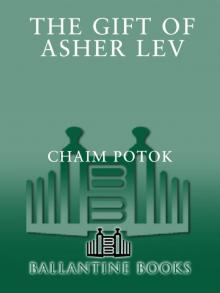 The Gift of Asher Lev
The Gift of Asher Lev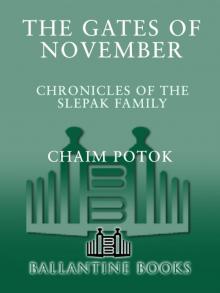 The Gates of November
The Gates of November In the Beginning
In the Beginning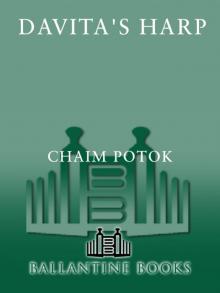 Davita's Harp
Davita's Harp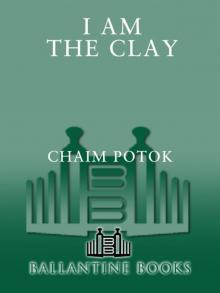 I Am the Clay
I Am the Clay The Promise
The Promise The Chosen
The Chosen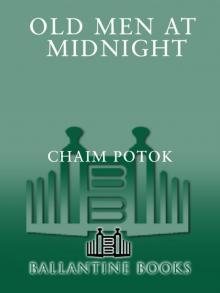 Old Men at Midnight
Old Men at Midnight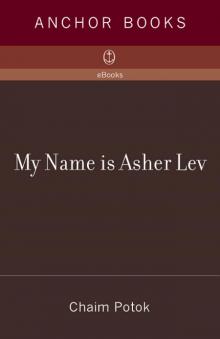 My Name Is Asher Lev
My Name Is Asher Lev